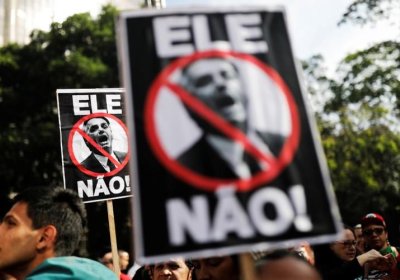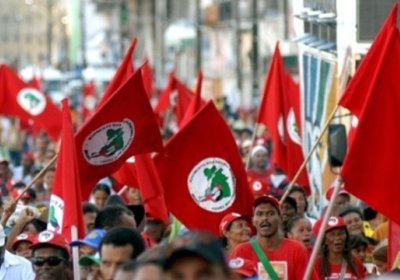A tailings dam owned by Brazilian iron ore producer Vale burst in Brumadinho in the state of Minas Gerais on January 25. This is the second of its tailings dams to burst in several years. Hundreds died and the devastation to local residents, water resources and biodiversity was immense.
Brazil
The world’s biggest producer of iron ore, Vale, has again distanced itself from an ecological and workplace disaster of its own making, writes Pip Hinman.
Update: Since this interveiw was published by Democracy Now!. President Trump has recognized Venezuelan opposition leader Juan Guaidó as interim president, calling democratically elected President Maduro “illegitimate.” In response, Venezuela has cut diplomatic ties with the U.S., giving diplomats 72 hours to leave the country.
Brazil’s far-right government of President Jair Bolsonaro will seek to classify “invasions” of farmland by landless workers as akin to terrorism, with harsher penalties for the activists, an Agriculture Ministry official said on January 14.
Brazil’s Landless Workers’ Movement (MST), one of Latin America’s largest social movements, seeks to take over unproductive lands in the name of social and economic justice to more equally distribute rural wealth.
Brazil is going through a profound political crisis, probably more serious than the military coup in 1964 that ushered in 25 years of authoritarian rule, writes Sue Bradford.
After his election as president in October, the neo-fascist Jair Bolsonaro began selecting his ministers. His most important decision — and one that will probably change the destiny of Brazil for many decades — was to choose Paulo Guedes, an advocate of extreme free-market economics, as a super-minister, responsible for a hugely-expanded finance ministry.
In 2008, the prestigious Council on Foreign Relations published a report titled US-Latin America Relations: A New Direction for a New Reality. Timed to influence the foreign policy agenda of the next US administration, the report asserted: “the era of the US as the dominant influence in Latin America is over.”
Then, at the Summit of the Americas the next year, then-president Barack Obama promised Latin American leaders a “new era” of “equal partnership” and “mutual respect”.
Shockwaves were sent around the world when fascist candidate Jair Bolsonaro won 55% in the second round in Brazil’s presidential elections on October 28, defeating Fernando Haddad of the Workers’ Party (PT).
Within 24 hours of Brazil’s election result being announced, protesters gathered outside the Brazilian consulate in Sydney to express their opposition to president-elect Jair Bolsonaro and his fascist agenda.
Far-right candidate Bolsonaro was elected president in a second round run-off against Workers’ Party (PT) candidate Fernando Haddad on October 28.
Brian Mier, editor of Brasil Wire and Voices of the Brazilian Left: Dispatches From a Coup in Progress, spoke to Green Left Weekly’s Federico Fuentes about the victory of fascist candidate Jair Bolsonaro in Brazil’s presidential elections, and what it means for the coming period.
Following the election of ultra-right candidate Jair Bolsonaro as president on October 28, left MPs and party leaders in Brazil have warned about the dangers that a reformed military government could bring to the country.
Five hundred academics, Nobel prize winners, human rights activists and celebrities have released an international statement against the rise of fascism in Brazil.
Among the initial signatories are: Argentine Nobel Peace prize winner Adolfo Pérez Esquivel, African-American rights activist Angela Davis, US Senator Bernie Sanders, US actor Danny Glover, Chilean socialist academic Marta Harnecker, US academic Noam Chomsky, British-Pakistani writer Tariq Ali and economist Thomas Piketty.
Brazilians vote on October 28 in an election that will be critical for the future of Latin America. Far-right candidate Jair Bolsonaro, who topped the first round of the presidential election on October 7, faces off against the Workers’ Party (PT) candidate Fernando Haddad in the second round vote.
Facing the real prospect of a Bolsonaro win, the country’s social movements are stepping up their efforts to confront fascism, at the polls and on the streets.
- Previous page
- Page 5
- Next page











